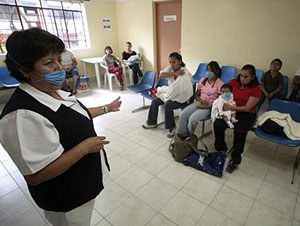Swine flu patients with respiratory failure survive
 Washington, Oct 13 - Most patients who experienced respiratory failure as a result of influenza A (H1N1) survived after being treated with oxygen, says a new study.
Washington, Oct 13 - Most patients who experienced respiratory failure as a result of influenza A (H1N1) survived after being treated with oxygen, says a new study.
Some patients developed severe acute respiratory distress syndrome (ARDS) and were treated with extracorporeal membrane oxygenation (ECMO), according to the study.
ARDS is a condition that leads to respiratory failure due to rapid fluid accumulation in the lungs. ECMO adds oxygen to the circulating blood.
ECMO was used for these patients because they had very low blood oxygen levels despite standard ventilator (or respirator) settings. It is generally used for a limited time because of the risks of bleeding, clotting, infection and organ failure.
ECMO investigators, along with Intensive Care Research Centre at Monash University, conducted an observational study of such patients in 15 intensive care units (ICUs) in Australia and New Zealand between June 1 and Aug 31.
The study found that 68 patients with severe influenza-associated ARDS were treated with ECMO, including 53 with confirmed influenza A (H1N1).
An additional 133 patients with influenza A received mechanical ventilation, but not ECMO, in the same ICUs. The 68 patients who received ECMO had a median (midpoint) age of 34.4 years and half were men.
"Affected patients were often young adults, pregnant or post pregnancy, obese, had severe respiratory failure..., and received prolonged mechanical ventilation and ECMO support," the authors write.
At the time of reporting, 54 of the 68 patients had survived. Six patients remained in ICU, including two who were still receiving ECMO. Sixteen patients were still hospitalised, but out of ICU, and 32 had been discharged from the hospital, according to a Monash University release.
"Despite their illness severity and the prolonged use of life support, most of these patients survived," the authors conclude. "This information should facilitate health care planning and clinical management for these complex patients during the ongoing pandemic."
These findings appeared online in the Journal of the American Medical Association (JAMA) and is slated for publication in its Nov 4 issue. (IANS)